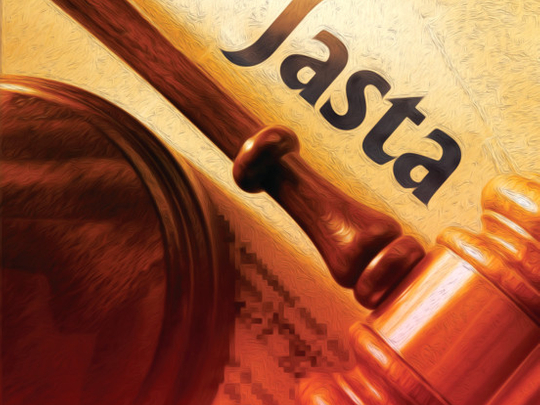
Justice Against Sponsors of Terrorism Act (Jasta) is a recent American law that was passed by the United States Senate with no opposition in May 2016. And in September 2016, it was unanimously passed by the House of Representatives. The law permits civil claims brought upon by the US against a foreign state or official for injuries, death or damages from an act of international terrorism.
The architects of the law, Charles Ellis “Chuck” Schumer, the senior US senator from New York who happens to be Jewish, and John Cornyn III, the senior Senator from Texas. Now why I mention the religious affiliation of one of the sponsors of the bill is that Jewish Schumer, a fervent stalwart of the Zionist American Israel Public Affairs Committee lobby, had once said on a radio programme: “One of my roles, very important in the United States Senate, is to be the shomer Yisrael (the guardian of Israel) and I will continue to be that with every bone in my body.”
Schumer, who was one of the most ardent supporters of the war against Iraq was no less hostile when it came to other Arab entities in the Middle East. Speaking at an Orthodox Jewish gathering in 2010, he had urged the Israelis to “strangle the Palestinians economically”. A firm believer that Palestinians do not belong on their lands, he justified his stance by adding that “the Palestinian people still don’t believe in a Jewish state. They don’t believe in the Torah. They don’t believe in King David, so they don’t think it’s our land.” Ours, Schumer? Aren’t you a US senator representing US interests above everything else?
Jasta, a bill widely viewed as one that allows legal action by families of nearly 3,000 people killed in the 9/11 attacks, was vetoed by US President Barack Obama who understood its far-reaching ramifications. In Obama’s words, “Jasta threatens to reduce the effectiveness of our response to indications that a foreign government has taken steps outside our borders to provide support for terrorism, by taking such matters out of the hands of national security and foreign policy professionals and placing them in the hands of private litigants and courts ... Second, Jasta would upset long-standing international principles regarding sovereign immunity, putting in place rules that, if applied globally, could have serious implications for US national interests.”
But in an election year, the US congress was having none of that. In an overwhelming bipartisan vote in both the Senate and House, lawmakers inflicted the first veto override of Obama’s presidency. Spurred on by powerful lobbies and special interest groups, many senators and representatives are also reluctant to oppose an emotional and popular measure favouring Americans. Furthermore, with presidential election just weeks away, none wanted to appear as being soft on terrorism.
The President’s show of disappointment was almost immediate. Speaking on CNN, Obama said: “The concern that I’ve had has nothing to do with Saudi Arabia per se or my sympathy for 9/11 families. It has to do with me not wanting a situation in which we’re suddenly exposed to liabilities for all the work that we’re doing all around the world and suddenly finding ourselves subject to the private lawsuits in courts where we don’t even know exactly whether they’re on the up and up, in some cases. So this is a dangerous precedent and it’s an example of why sometimes you have to do what’s hard. And, frankly, I wish Congress here had done what’s hard. I didn’t expect it, because if you’re perceived as voting against 9/11 families right before an election, not surprisingly, that’s a hard vote for people to take. But it would have been the right thing to do.”
Brave statements by a forthright leader, but unfortunately falling on deaf ears. Jasta is a law now and it is interesting that other countries have begun opening their dossiers on crimes of terrorism acted against them and will most likely fashion similar statutes in their books very soon. While the Saudis have proven time and again that there was no government involvement in the 9/11 attacks, other countries may realise that a jewel has fallen into their laps.
The Iraqis, for example, can sue the US for their entire gross national product to compensate for the colossal damage and misery caused to the country by US invasion. The military adventurism based on fabricated evidence of “weapons of mass destruction” allowed the US and its main ally, the United Kingdom, to tear the country apart, leading to the radical splintering that has today fostered some of the premium terror groups.
The Afghans could raise a similar lawsuit against the US, arguing that they had nothing to do with 9/11 and thus there was no justification of the thousands of civilian deaths by bombs and drones. The Palestinians can also take the US to court for providing armaments to the Israelis, armaments used to bomb, slaughter and kill entire communities, leaving behind an inexcusable death toll. War planes and helicopters as well as tanks generously supplied by the US have inflicted enormously higher casualties than what the US had suffered on that horrible day of September 11, 2001, and fuelling the 21st century holocaust against the Palestinian people.
The Libyans, Syrians and others may all join the bandwagon, leaving the US in a very precarious situation.
For now, the US lawmakers have placed their country into something of a pickle, making it as complicated to extricate themselves from it. Jasta may just bite them back and it would take courage to untangle this legal mess. However, with the current choice of US presidential candidates, it does not bode well come January 2017 when a new face takes over the White House.
Tariq A. Al Maeena is a Saudi socio-political commentator. He lives in Jeddah, Saudi Arabia. You can follow him on Twitter at www.twitter.com/@talmaeena.










